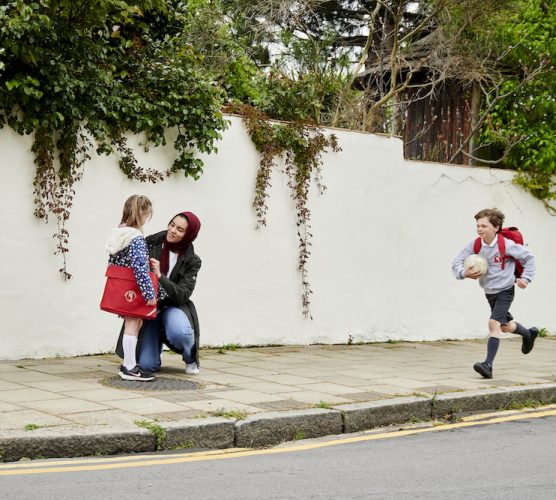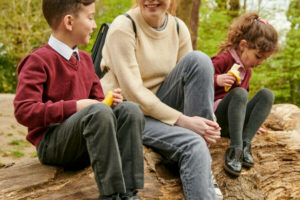The 2023 spring budget announced a £1,200 bonus for new childminders joining an agency like Koru Kids. We’ll share more information when details have been published.
If you already work as a nanny or childminder, the answer to this one is obvious. But when you have just started thinking about a career in childcare, the difference between the two could need clarification. After all, the roles have a lot in common. Both nannies and childminders look after other people’s children. So, what is the difference between a nanny and a childminder—and what does that mean when you work with Koru Kids?
Want to work in childcare?

Working with your own children
A nanny that works with Koru Kids can’t have their own children with them whilst they work. Parents won’t expect their nanny to bring their child with them to work, and if you ask, it’s likely you’ll be turned down. Nannies charge a higher cost per hour to a parent than they would pay for nursery or childminding, so they expect full one-on-one attention for their child. And with care taking place in the family’s home, it’s easy to see why it’s not the norm.
As a childminder, you can look after your own children at the same time. It’s actually one of the main reasons people choose this profession! Because of this, teachers and nursery workers who reach breaking point in the classroom and struggle to afford their own childcare often turn to childminding. Having your own children with you will affect your earnings, since they count towards your ratios as a childminder if they are young. But you will also save massively on your own childcare bills.
Where do nannies and childminders work?
A nanny doesn’t look after children in their own home. They’ll travel to the home of the child they care for, and work from there. They might have to pick the child up from school and walk them home, or take them to the park or playground. They generally don’t need to bring anything except for themselves. The family’s home is the base.
This is one of the main differences between nannies and childminders. Childminders work from their own home, and usually have children from more than one family at their setting. Think of it as a tiny nursery that you run from your own house! It must be a “domestic setting” where you receive your own mail.
How many children can childminders and nannies care for?
Nannies usually only look after 1 child, or 2. They look after children from the same family, unless they are doing a nanny share. A nanny share means looking after children from two different families at the same time. The nanny earns more, and the families save money by splitting the cost–win win!
Childminders can look after up to 6 children under the age of 8. 3 of them can be under 5, and 1 of them can be under 1. At Koru Kids, our Early Educators usually look after 3 children between the ages of 6 months to 5 years. But you can also work with an assistant and have up to 6 children under the age of 5 between you. It all depends on the space in your home.
How old are the children?
Nannies often look after school-age kids. Finding good after school childcare is hard–a nanny that can pick a child up after school and spend quality time with them until the parents get home from work is a real life-saver.
Childminders look after children of many different ages, but at Koru Kids we focus on the early years, and that means 6 months to 5 years. You could have a 1-year-old, a 3-year-old, and a 4-year-old, all under one roof. It creates a cozy, family-like group, where the little ones learn from older children, and older children get to practice empathy and kindness.

What hours do childminders and nannies work?
The amount of time you work is one of the main differences between nannies and childminders, especially at Koru Kids. Nannies might work as little as 3 hours a week, and often only afternoons. The nannies that specialise in looking after babies and toddlers are more likely to be required for full days. And of course, families’ needs are different, so some could need help on weekends, or later in the evenings. But it’s not uncommon to only work a couple of afternoons in a week, making it easy to do alongside university courses or other commitments.
Childminders are self-employed, so you have control over your hours. It’s worth remembering that parents often need to be able to leave their children in care for a full day. Shorter hours just wouldn’t fit around their schedule. Because of this, a self-employed childminder with Koru Kids would need to be available at least 4 full days per week. Our home nurseries open at 8am and close at 6pm, so this is a full-time occupation. You could also work 5 full days per week, which would be really welcome for many parents that are struggling to find childcare.
Nanny or childminder and the EYFS
This is another clear difference between a nanny and a childminder. EYFS stands for Early Years Foundation Stage, and if you become a nanny, this could be the last you’ll hear about it. It’s a framework for everything an Early Educator needs to think about when helping children learn and grow. Many parents will love it if you have certain skills, like a second language, or a maths degree. But it’s not a requirement, and it only applies to children in the early years of their life.
So, although nannies sometimes help children with homework, they don’t generally need to know anything about the EYFS. Koru Kids also offer activity cards and booklets for more early years support.
In contrast, a childminder must be really familiar with the EYFS. It’s an Ofsted requirement, so it’s not specific to Koru Kids. But it’s very important to us too. That’s why we call childminders who work with us Early Educators. The training and support they get from us in understanding and implementing the EYFS in their home nurseries is substantial. This doesn’t mean our Early Educators become teachers. It just means that they understand a lot about early years development, and encourage and support children to be school ready.
Training and set-up to become a nanny or childminder
Nannies are offered training by Koru Kids. It’s all online and flexible around your schedule–in fact it only takes 1.5 hours to complete in total. So if you’re a student who wants to work as a nanny, our nanny training will probably feel pretty easy next to your coursework. After we have helped you find a family, you’ll also complete some online first aid training. There’s additional training and support available if you want it. For example, for nannies that are struggling with children’s dinner ideas we have created a beautiful recipe book that you can download here.
Childminders need the most substantial training to start working and register with Ofsted or an agency. And it can be expensive, which is why we cover the costs. This includes safeguarding, EYFS, safe sleep, food hygiene, guided outdoor learning, paediatric first aid, and much, much more. Most of this training is online too, so it’s perfectly possible to do alongside a full-time job, or studies. It just requires a bit more juggling and time.
Running a business as a nanny or childminder
A nanny can start working with Koru Kids as soon as they have cleared their DBS check and completed their first aid training. Koru Kids does all the admin, so you don’t have to do your own taxes or send invoices. We help with all of that. We run payroll and even help run a pension for you if needed. You are employed directly by the family you work for, so you’re not running your own business.
Childminders are self-employed. This means they run their own business. But it doesn’t mean they have to do it all by themselves! Koru Kids provides an accountant, helps with self-employed pensions, provides policies, does their invoicing and payments for them, and even vets and trains their assistants. So admin and paperwork are brought down to the absolute minimum. We help you market and find families to fill your spaces. And we even prepare policies for you, keeping an eye on changes from Ofsted or to the EYFS. This means more time with the children you look after, and less time crunching numbers on a weekend. If you register directly with Ofsted, you will need to run the business side of things solo.

Nanny or childminder: what can you earn?
Earnings can be substantially different between a nanny and a childminder, partly because nannies tend to work fewer hours. In London, Koru Kids nannies make £10.25–£13.95 per hour, depending on their previous experience and age. An after school nanny that decided to seek full time work could find several families to fill the hours in their week. Full-time Early Years Nannies can expect to earn £27,000–£42,000 per year, depending on their experience, location, and additional qualifications.
Koru Kids Early Educators in inner London can make up to £70,000 per year, but it depends on where they live, how many hours they work per week, and how many children they are looking after. £30,000+ is a realistic expectation. But if you want a better idea of your future earnings, please just give us a call on 02080505674, and our team will be able to help you work out your earnings potential.
Parent relationships with childcarers
Parents don’t usually expect after school nannies to have a huge amount of childcare expertise. After school nannying can often be a ‘learning on the job’ kind of experience, ideal for students. So you will be expected to work to the family’s and child’s routine. Families sometimes see their nannies not only as childcare heroes, but a helping hand around their home. They might ask their nanny to help out with simple things around the house, like filling the dishwasher, or making the children’s beds. It’s not a requirement, and it’s something you have to decide together with the parents.
A childminder has more of an expert role. Most have previous childcare experience, such as bringing up their own children or working in a nursery, or primary school. At Koru Kids, the training is so extensive that our childminders come out with a lot of knowledge that parents tend not to have themselves! Although a childminder will try their best to accommodate a child’s nap schedule and routine, they will also have their own routine and other children in their care that the families need to be aware of.
Nannies and childminders: holidays
Both nannies and childminders at Koru Kids receive holiday pay alongside their salary.
Nannies have to confirm holidays with the family in advance. Since the family employs them and are often reliant on them for childcare, it’s important they check before they book. Koru Kids part-time nannies get their holiday pay as part of their regular salary. This gives them freedom to put their holiday pay towards whatever they choose.
Childminders are self-employed. Usually, this means they lose income when they take a holiday. But Koru Kids childminders have agency support. This means you are paid enough by the families you work with to put money aside, so you don’t lose income when you take a holiday. Looking after children is really rewarding, and also quite hard. So having money to cover your holiday is a huge benefit for self-employed childminders. They still need to give parents plenty of warning so they can arrange alternative childcare, but they have more control over when they take their holiday.
Ofsted registration for nannies and childminders
Nannies don’t need to be registered with Ofsted. You can choose to do this, but it’s not a requirement. This is a clear difference between being a nanny and becoming a childminder.
Childminders must legally be registered, either directly with Ofsted or with an agency. Koru Kids is an Ofsted-registered childminding agency. That means we send one of our friendly assessors out to do your registration visit, when you are ready. Before then, we will have offered you so much free training and support that you should be able to pass your registration visit with flying colours. So if you work with Koru Kids, we deal with Ofsted so you don’t have to!

Choosing to be a nanny or childminder
Ultimately, a nanny role and a childminder role can be very different. But there is one important similarity. Nannies and childminders love working with children! They find it fun and enjoyable. They bring their own personalities and experiences, and enrich a child’s life. Nannies and childminders are important role models. They help children grow up to be kind, curious, and emotionally resilient.
So if you want to help a child grow to appreciate other people’s differences, and treat people fairly; fall and get up again; trust adults, and be honest themselves; explore, and stay curious; understand that we need to look after the world; and adapt to whatever life brings their way… make the choice to work in childcare as a nanny or childminder. It’s so rewarding!



